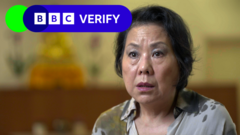An alarming trend of blessing scams has emerged, with criminals targeting older Chinese women across countries like the UK, US, Canada, and Australia. Victims are manipulated into handing over their precious possessions under the guise of spiritual protection for their loved ones. Both police and communities are calling for greater awareness and action against these deceitful practices.
The Blessing Scam: A Deceptive Threat Targeting Vulnerable Communities

The Blessing Scam: A Deceptive Threat Targeting Vulnerable Communities
Scammers are exploiting cultural beliefs within Chinese communities across the globe, leaving victims devastated as they lose their cherished valuables in elaborate street cons.
In recent months, a disturbing pattern has emerged as scammers exploit traditional beliefs within Chinese communities in countries including the UK, the US, Canada, and Australia. This trend has been described as the "blessing scam," in which vulnerable elderly women are persuaded to surrender their valuables under the pretense that their loved ones are in imminent danger.
Victims, often approached by a group of three women speaking Cantonese, find themselves caught in an elaborate con that plays out like street theater. In one such case, a woman named Mungnee, who resides in London, was targeted while en route to a yoga class. A distraught stranger claimed her husband was ill and mentioned a local traditional healer. Driven by compassion and cultural beliefs, Mungnee was easily swept into the deception.
As the con unfolded, Mungnee was informed by the women that not only was she in trouble, but that her son faced a life-threatening accident within days. To avert this disaster, they insisted on a ceremonial "blessing" requiring her to produce cash and jewelry, which would later be returned. Trusting the scammers, Mungnee withdrew £4,000 from her bank account and hurriedly gathered personal items she believed could ward off evil spirits.
In the heat of the moment, Mungnee did not see the exchange of bags as the women quickly switched her valuables for nonsensical items. Only upon returning home, when she gazed into the bag, did she realize she had been tricked. The feeling of betrayal gripped her as she recounted her family's long-held jewelry lost—not just monetarily, but sentimentally.
Despite growing awareness, police forces across multiple nations continue to grapple with the blessing scam epidemic, issuing public warnings for susceptible communities. Experts suggest these scams capitalize on trust and familiarity within Chinese cultural paradigms, making them particularly insidious.
Tuyet van Huynh, a campaigner whose mother fell victim to a similar scam, has taken to social media to warn others and encourage them to recount their experiences. Cameras recorded her mother's encounter with the scammers, showing the vulnerable individual being led like a puppet, highlighting how quickly victims can be manipulated.
Some speculate that psychological manipulation, possibly involving drugs like Scopolamine, could play a role—rendering victims suggestible while leaving them seemingly aware of their actions. However, no concrete evidence links such substances to the scams reported in the UK, complicating law enforcement efforts.
As victims begin to unite and share their stories, the hope for justice grows. Mungnee expressed her determination to assist investigators in tracking down the culprits, lamenting, "It's frustrating to see our own people conning their own." With shared initiatives aiming to raise awareness, communities strive to protect potential targets from falling prey to these emotional and material losses.





















